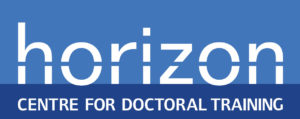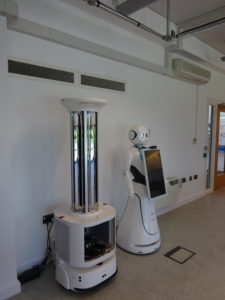Students from the Horizon Centre for Doctoral Training (CDT) were hosted by the Cobot Maker Space to present their visions of healthcare utopias, and how to avoid ending up in a medical dystopia.

From robotics and AI to health tracking and gene sequencing, are we headed towards a utopian or dystopian future for healthcare? For Future Products Sector Day at the Horizon CDT programme, our group were asked to present our future visions of healthcare to the PhD cohort. Using the range of robots available within the Cobot Maker Space, we demonstrated and discussed how these technologies could be used to the benefit or detriment of human wellbeing in the future.
Demonstrations included a UV cleaning robot (Zappy), which could be used to disinfect hospitals, telepresence robots which could be used for remote doctors’ visits, and companion robots for older people. In a walkaround tour of the living space, an experimental area designed to simulate a home living room and kitchen, we demonstrated how Internet of Things sensors could be used to monitor activity and help people track their health. These technologies have great potential to allow people to take control of their wellbeing, keep medical professionals in the loop and ultimately allow people to live in their own homes for longer. However, this raises questions about surveillance, data protection, privacy, and dignity for older people.

Academics from the University of Nottingham contributed their expertise, including Professor Praminda Caleb-Solly, who spoke about her work researching robots to help support older people. Praminda spoke about work at the CHART research group, and how robots could be used to enable and enhance human-human interaction for health and care, rather than replace it. Epidemiology PhD student Salma Almidani also spoke via video link, discussing future pandemics, vaccine hesitancy, and where technologies may be useful in healthcare ecosystems of the future.
The afternoon finished with the talks from us – the Horizon CDT 2022 cohort. Jon Chaloner spoke about universal health coverage and how we can work towards providing everyone worldwide with a full range of accessible healthcare across their lifetime. Gift Odoh talked about how healthcare and telepresence robotics can influence and benefit each other, through technology and knowledge exchange. Finally, I closed by talking about the future of pain, and how we could use robotic devices and sensing technology to better understand and respond to and manage pain.
The afternoon provided a range of emerging perspectives on the future of healthcare, and debate about how these technologies could be used and abused. Ultimately, by discussing and exploring imagined utopias of the future, perhaps we can identify routes to get there, whilst avoiding some of the dystopic pitfalls along the way.
Written by Angela Higgins